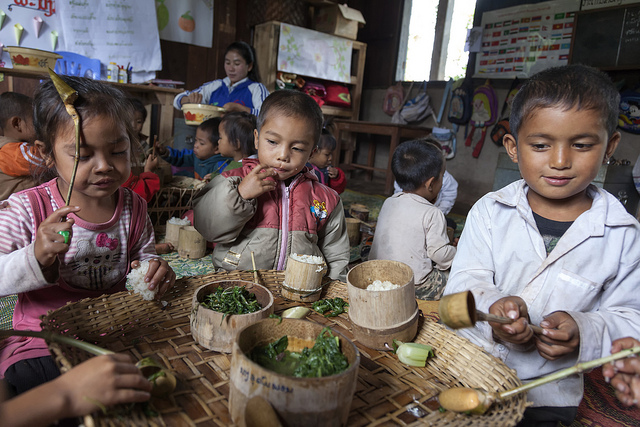Of the many issues relevant to international development and poverty reduction, which would you rank as being the most important? According to Dr Jim Kim, World Bank President, the biggest single issue in development is that one in four children suffer from stunting (being well below average height for their age), an indicator of chronic malnutrition among children.
During the World Bank Annual Meetings in October, Dr Kim said:
“Poor nutrition, few opportunities for early learning and stimulation, and toxic environments literally hardwire young children to miss out on opportunities to learn and later to earn good wages.”
Many countries including Australia have welcomed the reappointment of Dr Kim as World Bank President for the next 5 years. One of Dr Kim’s stated priorities for his second term is an increased focus on nutrition and early childhood development.
On 6 October 2016, the World Bank hosted the ‘Investing in the Early Years’ Summit during its Annual Meetings, at which senior ministers from eight countries made commitments to promote early childhood development and reduce stunting among children. Key commitments from the Summit (outlined in the World Bank’s media release and the author’s notes from the event) were:
- Cameroon committed to reduce chronic malnutrition among children up to the age of 5 from 32% to 25%, through a multisectoral approach involving education, health and safety nets.
- Côte d’Ivoire launched the National Multisector Plan for Nutrition which will mobilise $470 million to scale up investments in nutrition, and has set goals for 2020 of increasing health care coverage from 55% to 90% of the population; ensuring all children aged 6 to 16 are going to school; and reducing the proportion of the population in poverty from 46% to 20%.
- Ethiopia committed US$600 million for decentralised services to support local health, education, and agriculture services, and is seeking support from the International Development Association to expand education and social protection.
- Indonesia committed to action on early childhood development, including a conditional cash transfer program to promote behaviour change and promote child development; and an earmarked fund to support early childhood education.
- Madagascar indicated it is piloting several interventions aimed at reducing chronic malnutrition and its social protection policy includes conditional cash transfers designed to encourage children to attend school and mothers to participate in stimulation activities for young children.
- Pakistan committed to action to reduce stunting and wasting of children by 2025, through priority early childhood interventions in several key sectors. National nutrition spending in Pakistan is just over 1% of GDP.
- Tanzania indicated that it is investing $150 million in nutrition and is taking complementary action on agriculture, water and sanitation. The Tanzania Social Action Fund also provides conditional cash transfers to the poorest 15% of households, to promote prenatal care and pre-primary school enrolment.
- Senegal plans to increase social spending from 38% to 40% of the national budget by 2017, and increase the share of social spending for young children. Senegal will be introducing family transfers for 300,000 of the poorest families, supporting vaccination and school attendance for children.
Dr Shenggen Fan, Director-General of the International Food Policy Research Institute, has previously identified the causes of, and policies to deal with, hunger and malnutrition. The actions various countries have announced address his suggested priorities for nutrition-specific measures and social safety nets, but give less attention to how to improve agricultural production and markets. Support from multilateral agencies such as the World Bank and development partners such as Australia are essential to deliver this range of policy responses.
The Investing in the Early Years event and related commitments are of great relevance to Australia’s aid program. Countries in our region have among the highest rates of stunting of children in the world (the proportion of children suffering from stunting is 49.5% in Papua New Guinea and 57.7% in Timor Leste [pdf], for example). Therefore, investing in action on child malnutrition is crucial in achieving Australia’s development goals for the region.
Moreover, two Parliamentary Committee reports issued in May of this year – Delivery and effectiveness of Australia’s bilateral aid program in Papua New Guinea by the Senate Committee on Foreign Affairs, Defence and Trade, and Food for thought: improving health and nutrition in the Indo-Pacific region, by the Joint Standing Committee on Foreign Affairs, Defence and Trade – called on the Australian Government to devote additional resources to, and develop a strategy for, nutrition programs in the Asia-Pacific region.
As a significant financial contributor to the World Bank, the Australian Government and Parliament have an interest in holding the Bank accountable for supporting countries financially in achieving their nutrition and early childhood development goals, in line with Dr Kim’s stated priority.
The response by the Australian Government to the Food for thought report by the Joint Committee on Foreign Affairs, Defence and Trade, due shortly, will be a test of the priority it is prepared to give to nutrition through its aid, trade and agricultural research policies, and of how much it will complement the World Bank President’s renewed priority for nutrition and early childhood development.
Mark Rice is RESULTS Australia’s Policy and Advocacy Manager.



Australia’s two Parliamentary Committee reports mentioned above, recommending that our government provides additional resources for nutrition programs in the Asia-Pacific region, is indeed heartening. As with many written tomes, the words are impressive. While most lucky Ozzies – including politicians – plan Christmas dinners, those abhorrent high rates of malnutrition and stunting in our neighbouring countries’ young children, should make us all determined to see those impressive words put into practice during 2017.